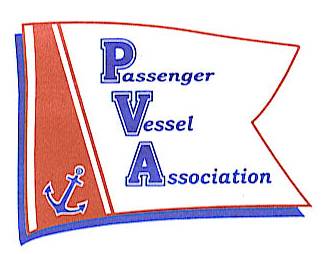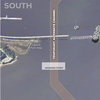PVA Calls for TWIC Re-Evaluation
Passenger Vessel Association Marks 10th Anniversary of Maritime Security Law; Calls for Reevaluation of TWIC.
On the tenth anniversary of the enactment of the landmark Maritime Transportation Security Act of 2002 (MTSA) (Public Law 107-295), the Passenger Vessel Association (PVA) takes note of the far-reaching security enhancements adopted by the U.S. flagged passenger vessel industry but also calls on Congress to re-evaluate the expensive and unsuccessful Transportation Worker Identification Credential (TWIC) program.
“The safety and security record of the U.S.-passenger vessel industry over the past decade is outstanding,” said PVA President Paul Belforti. “Members of the general public can be confident that when they embark on a U.S. ferry, dinner or sightseeing boat, or coastal overnight cruise ship numerous measures are being undertaken to ensure security.”
In large part, this is a result of the vessel and facility security plans being implemented pursuant to PVA’s Coast Guard-approved Alternative Security Program. PVA members have implemented effective security measures. At the same time, however, PVA believes that the Transportation Worker Identification Credential (TWIC) has proven itself to be burdensome and ineffective in the context of contemporary U.S. passenger vessel industry operations.
Vessel and Facility Security Plans and the PVA Alternative Security Program
MTSA and its implementing regulations require every U.S.-flagged passenger vessel authorized to carry 150 passengers or more to have a Coast Guard-approved vessel security plan. In addition, every shoreside terminal and facility at which such a passenger vessel calls must also have a facility security program. A security plan must be developed following a rigorous vessel and facility risk analysis. Coast Guard regulations specify the various required elements of a security plan.
As permitted by MTSA and in coordination with the U.S. Coast Guard, PVA developed the PVA Industry Standard for Security of Passenger Vessels and Small Passenger Vessels and their Facilities. It is tailored especially for the typical security needs of U.S. passenger vessels. The PVA Alternative Security Program (ASP) is approved by the Commandant of the Coast Guard and designated by the U.S. Code of Federal Regulations as a permissible method of complying with MTSA. It is available only to members of the Passenger Vessel Association.
TWIC and TWIC Readers
While PVA supports appropriate security measures, it is readily apparent that for the U.S.-flagged passenger vessel sector, the Transportation Worker Identification Credential (TWIC) has shown itself to be ineffective in promoting security and highly burdensome to passenger vessel operators and U.S. mariners.
Hundreds of thousands of U.S. citizen mariners, including crew members of U.S. passenger vessels have obtained TWICs. Issued by a private contractor operating for the Transportation Security Administration and good for five years, a TWIC is form of identification with encrypted information issued to an individual working in the maritime sector after an extensive criminal and terrorist background check. A separate, and somewhat duplicative, background check is also required of individuals seeking a Coast Guard merchant mariner document or license. In addition, the TWIC applicant must appear in person two separate times at a designated enrollment center (often located hundreds of miles from the home of the applicant), frequently absorbing travel and overnight lodging costs, and lost wages for time off, and pay a fee of $132. Issuance of a TWIC is necessary for an individual to be granted unescorted access to a designated restricted area of a vessel or facility with a security plan.
The passenger vessel sector has found that, in reality, the employer must bear these expenses or reimburse the employee for them. This is necessary to stay competitive in obtaining qualified labor, because workers can avoid these costs altogether by seeking non-maritime employment.
The original concept contemplated that electronic readers would be installed to scan the encrypted information on TWICs to ensure their continued validity. PVA maintains that TWIC readers are not necessary to ensure security on U.S. passenger vessels. Mandating them for this sector would impose an expensive burden, interfere with day-to-day operations and fail to provide additional security.
Three PVA members participated in the Transportation Security Administration’s TWIC reader pilot program—these included the Staten Island Ferry, a sightseeing boat company in Annapolis, and a high-speed ferry in Puget Sound— and all three operators reported that they derived no security enhancements from TWIC readers. Most U.S. passenger vessels are operated by small companies or small entities. Crew members are individually known to and recognized by management, as well as to other crew members. It is not necessary to have TWICs for identity purposes, and no reason would be served by the installation of TWIC readers.
Passenger vessels depend on easy access for commuters, customers, and visitors. Ferries adhere to tight schedules, carry tens of thousands of riders each day, and function as forms of mass transit. Dinner boats and sightseeing vessels must attract paying customers and compete with their equivalent shoreside venues (hotels, restaurants, tour busses, etc.). Even if a passenger vessel is required to have a Coast Guard-approved vessel security plan, most parts of the vessel are open to members of the public.
“The Passenger Vessel Association and its members will continue to work with the U.S. Coast Guard to maintain vessel and facility security that the public expects,” said Belforti. “At the same time, the tenth anniversary of the enactment of the Maritime Transportation Security Act is an appropriate milestone to reassess the elements of the law that aren’t working; particularly TWIC and TWIC readers.”











